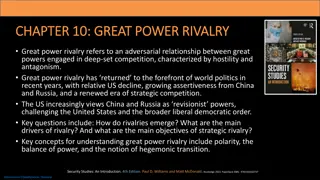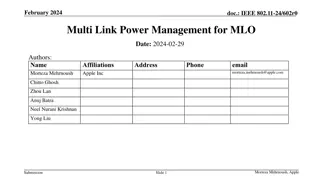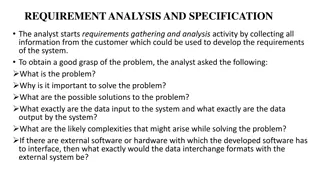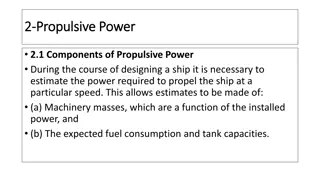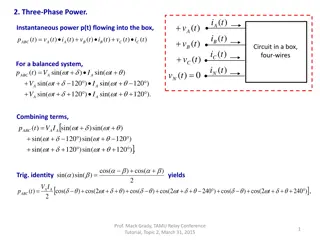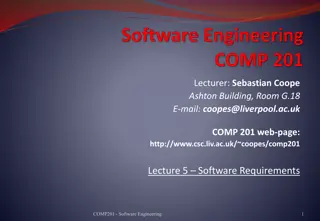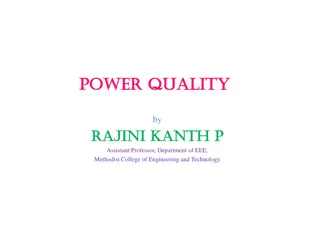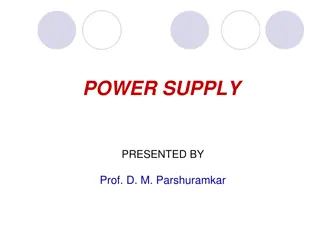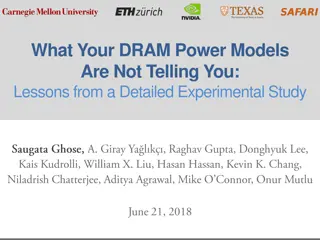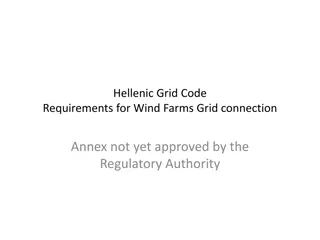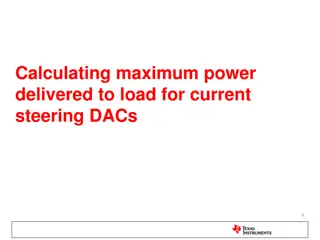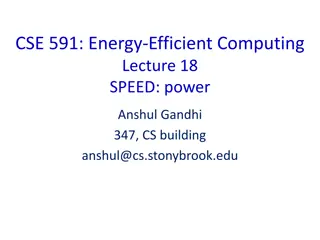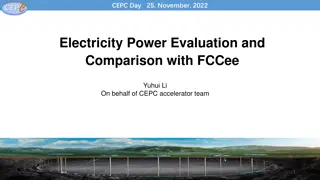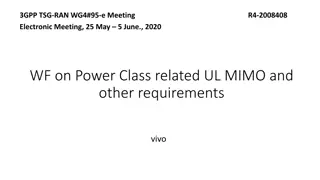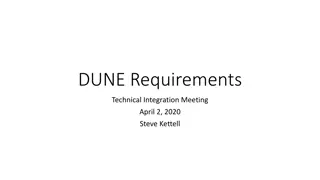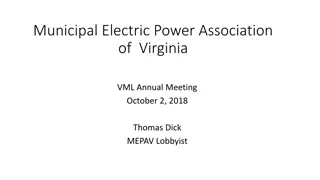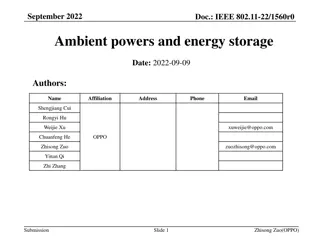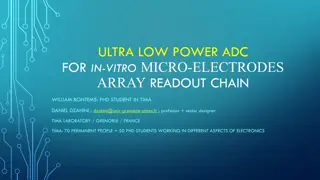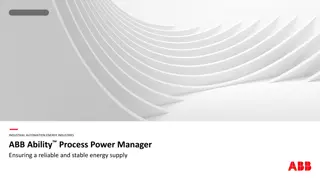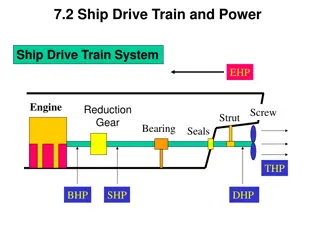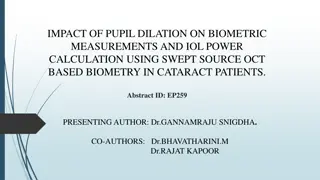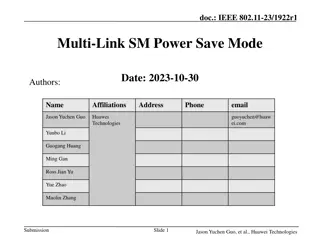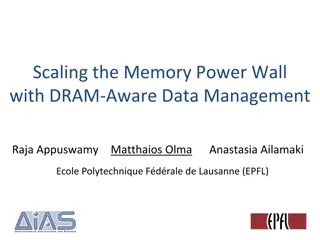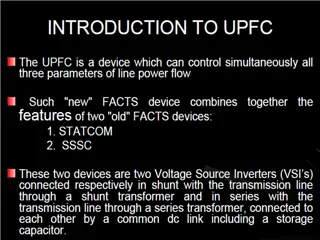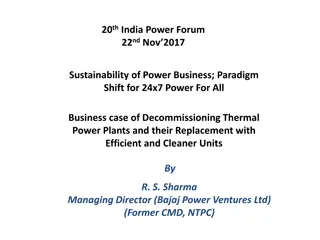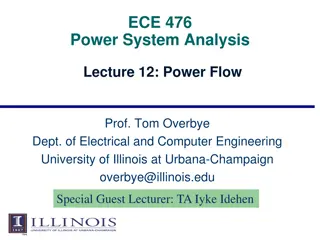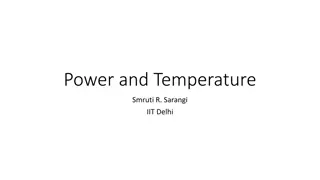Cisco Systems Fault Managed Power Portfolio Overview
Cisco Systems offers an industry-leading Fault Managed Power (FMP) patent portfolio comprising 24 active assets across seven INPADOC families. The portfolio includes patents supporting fault-managed power systems, PoE deployments, DC power distribution, DC-DC conversion, and HVDC connectors. The FMP
4 views • 4 slides
Power Distribution in Data Centers Overview
Power distribution and equipment play crucial roles in commercial data center infrastructure, ensuring reliable and efficient operations. Adequate power routing from the grid or generators to data center equipment is vital for stable operations, data integrity, and performance maintenance. This incl
4 views • 19 slides
Great Power Rivalry in World Politics: Understanding Polarity, Balance of Power, and Hegemonic Transition
Great power rivalry involves deep competition and hostility between major players like the US, China, and Russia. The concept is explored through polarity, balance of power, and hegemonic transition theories, discussing power distribution, strategies, and transitions in the international system. The
4 views • 12 slides
Improving Multi-Link Power Management Efficiency in IEEE 802.11 Networks
The document discusses challenges with per-link power mode changes in multi-link scenarios in IEEE 802.11 networks, proposing a solution for more efficient power management. It addresses issues such as latency and inefficiencies in signaling for power mode changes, introducing scheduled multi-link p
6 views • 9 slides
Understanding Power Transfer and Impedance Matching in Circuits
Exploring the concept of maximizing power transfer between a source and load through impedance matching. Learn about complex conjugates, real and magnitude of complex numbers, average power in circuits, and the importance of minimizing reflected power. Discover how incident, reflected, and delivered
2 views • 33 slides
Software Requirement Analysis and Documentation Process
The requirement analysis and specification process involves gathering information from customers, identifying the problem, solutions, data requirements, complexities, and potential interfaces. Key components of a Software Requirements Specification (SRS) document include functional requirements, non
0 views • 23 slides
Understanding Ship Propulsion Power Estimation
In the process of ship design, it is crucial to estimate the power required for propulsion to determine machinery masses, fuel consumption, and tank capacities. Power estimates can be derived through comparisons with existing vessels or model tests, involving scaling laws for different components. S
0 views • 19 slides
Overview of Farm Power Sources and Utilization in Agriculture
Farm power sources in agriculture include human, animal, mechanical, and renewable energy. Human power is costly but versatile, while animal power is traditional and provides manure. Mechanical power from tractors and engines is efficient. India's farm power sources reflect a mix of traditional and
0 views • 12 slides
Understanding Three-Phase Power Systems and Instantaneous Power Flow
This detailed content delves into three-phase power systems, analyzing instantaneous power flow, balanced circuits, and trigonometric calculations. It explores the concept of constant three-phase power and provides insights into the analogy of a piston engine with infinite cylinders. The data includ
2 views • 9 slides
Power Transmission and Distribution Network of Tunnel Boring Machine Site
The power transmission and distribution network at the tunnel boring machine (TBM) site involves electrical motors, generators, transformers, and power cables to efficiently operate TBMs for tunnel construction. The system includes multiple generators, transformers, junction boxes, and power distrib
1 views • 7 slides
Understanding Software Requirements and Design Principles
Software requirements play a crucial role in defining what a system should do, while the design describes how it achieves those goals. This lecture series covers the concepts of user and system requirements, techniques for describing system requirements, organizing software requirements in a documen
1 views • 30 slides
Understanding Thermal Power Plants: Overview and Operation
Thermal power plants play a crucial role in converting heat energy into electricity for various applications. This article covers the definition, layout, working principle, and components of thermal power plants, highlighting their advantages and top features. From converting heat into mechanical po
0 views • 20 slides
Understanding Power Quality and Its Impact on Electrical Systems
Power quality refers to the characteristics of electrical power that drives sensitive equipment. It involves voltage and current deviations from ideal waveforms, impacting the efficiency and reliability of electrical systems. Various types of power quality phenomena exist, such as voltage variations
1 views • 16 slides
Understanding Power Supplies and Rectifiers in Electrical Systems
Power supplies play a crucial role in converting AC power to DC power, with two main types being unregulated and regulated. Regulated power supplies consist of essential components like a step-down transformer, full-wave rectifier, filter circuit, and voltage-regulating circuit. Rectifiers are devic
0 views • 25 slides
Insights into DRAM Power Consumption and Design Concerns
Detailed experimental study reveals that DRAM power models may not provide accurate insights into power consumption. The increasing importance of managing DRAM power in system design is emphasized. The study delves into DRAM organization, operation, and power consumption patterns, highlighting the n
0 views • 43 slides
Requirements for Grid Connection of Wind Farms in Hellenic Grid Code
The Hellenic Grid Code outlines the specific requirements for wind farms regarding grid connection, including frequency and voltage operation boundaries, active/reactive power boundaries, voltage/reactive power control, and load-frequency control. These requirements ensure the safe and efficient int
0 views • 6 slides
Helicopter Power Management Guidelines
Understanding the factors that can lead to power required exceeding power available in a helicopter is crucial for safe operation. Indications such as uncommanded descent, rotor droop, loss of tail rotor authority, and right yaw signal potential issues to watch out for. Knowing when such occurrences
0 views • 11 slides
Calculating Maximum Power Delivery to Load in Current Steering DACs
In the process of calculating the maximum power delivered to the load for current steering DACs, several steps are involved, such as determining the peak-to-peak voltage at the DAC output, converting it to RMS voltage, calculating power delivered to the load, and converting power to dBm. Examples wi
0 views • 5 slides
Exploring Power Efficiency in Computing Systems
In this lecture series on energy-efficient computing, various concepts related to dynamic frequency scaling, power capping, power shifting, power modeling, and power measurement are discussed. The impact of power on server speed is explored, alongside strategies for improving performance within powe
0 views • 17 slides
Reflections on Power Through Poetry
Explore the complexities of power through a collection of thought-provoking poems that delve into themes of control, influence, and the impact of power dynamics on individuals and society. Contemplate the acquisition, maintenance, and ethical use of power, as well as the consequences of its abuse. R
0 views • 13 slides
Comparison of Electricity Power Systems Between CEPC and FCCee
The evaluation and comparison of electricity power systems between the CEPC and FCCee accelerators reveal the power breakdowns, RF power consumption, magnet power supply, and overall power usage. Differences in power consumption for various components such as RF, magnets, and vacuum systems are high
0 views • 19 slides
3GPP TSG-RAN-WG4#95-e Meeting Summary: Power Class Requirements and Way Forward Decisions
During the 3GPP TSG-RAN-WG4#95-e meeting, discussions were held on power class requirements, UL MIMO, and other related topics. The meeting covered various options for setting up TxD requirements, focusing on Release 16 independence, UL MIMO emission requirements for R15, NSA NR power class clarific
0 views • 6 slides
Technical Integration Meeting: DUNE Requirements Overview
Detailed overview of proposed changes and requirements discussed in a technical integration meeting for the DUNE project. The meeting covered outlined changes to owned requirements, proposed alterations to TDR requirements, and consortia requirements. Specific details include changes to EB requireme
1 views • 12 slides
Overview of Public Power in Virginia: Transparency, Accountability, and Wholesale Contracts
Public power in Virginia is characterized by accountability, transparency, and efficient service. Local government oversight ensures citizen input and approval in decision-making processes. Wholesale power supply contracts with entities like American Municipal Power and Dominion Virginia Power enabl
0 views • 10 slides
Ambient Power Harvesting Technologies Overview
This document discusses various ambient power harvesting technologies such as RF energy, solar power, light, and thermal energy. RF-based energy harvesting utilizes radio waves for power transmission with potential applications in logistics, smart homes, and environmental monitoring. Solar power off
0 views • 12 slides
Ultra Low Power ADC for In-Vitro Micro-Electrodes Array
Collaborative research project at TIMA Laboratory in France focusing on developing ultra-low power Analog to Digital Converters (ADC) for in-vitro micro-electrode arrays, aiming to enhance communication with the brain using electronics sensors. The project addresses key limitations such as power dis
0 views • 6 slides
Understanding Bankable Power Purchase Agreements in Independent Power Projects
Power Purchase Agreements (PPAs) play a crucial role in independent power projects, governing the sale and purchase of power between ProjectCo and the Offtaker. A bankable PPA is essential for a project to reach financial close, as it provides revenue for ProjectCo to repay funders and cover operati
0 views • 30 slides
Power Quality Monitoring and Evaluation in Modern Energy Systems
Power quality is crucial for stable operations in energy systems. This content discusses issues in power supply, reasons for measuring power quality, consequences of bad power quality, methods for measuring power quality, and evaluation techniques for compliance reports. Tracking power quality param
0 views • 21 slides
ABB Ability Process Power Manager for Energy Industry Facilities
ABB Ability Process Power Manager offers a comprehensive solution for power management in energy industry facilities. It addresses challenges such as managing multiple power sources, minimizing downtime, enhancing safety, optimizing aging assets, and coping with margin pressures. This intelligent an
0 views • 22 slides
Understanding Ship Drive Train and Power Systems
Ship drive train and power systems play a crucial role in the propulsion of ships. Components like engines, reduction gears, screws, bearings, and seals work together to convert engine power into thrust horsepower (THP) that drives the propeller. Various types of horsepowers like effective horsepowe
0 views • 85 slides
Impact of Pupil Dilation on Biometric Measurements in Cataract Patients
Cataract surgery requires precise intraocular lens power calculation for optimal refractive outcomes. This study explored the effects of pupil dilation on biometric measurements (such as axial length, corneal power, anterior chamber depth, lens thickness) and IOL power calculation using SS-OCT based
0 views • 7 slides
Power Dynamics in the Hellenistic World: A Study of Olympias of Macedon
Exploration of power dynamics in the Hellenistic world through the multidimensional exercise of power by Olympias of Macedon. The study delves into various forms of power such as reward, coercive, legitimate, referent, and expert power, shedding light on their roles in shaping leadership and influen
0 views • 20 slides
Proposal for Mobile-AP Power Save in IEEE 802.11
This proposal by Neel Krishnan and team from Apple addresses the need to reduce power consumption in software-enabled access points (Mobile-APs). The focus is on prolonging battery life by minimizing power usage while ensuring full capabilities for associated STAs. The solution involves transitionin
0 views • 11 slides
Enhancing Power Efficiency in IEEE 802.11 Multi-Link SM Power Save Mode
The document discusses how Multi-Link Operation (MLO) in IEEE 802.11be can improve throughput and reduce latency but may increase power consumption for non-AP devices. It introduces the concept of Multi-Link SM Power Save mode to optimize power usage by activating multiple links only when necessary,
0 views • 10 slides
Understanding Power Consumption in Memory-Intensive Databases
This collection of research delves into the power challenges faced by memory-intensive databases (MMDBs) and explores strategies for reducing DRAM power draw. Topics covered include the impact of hardware features on power consumption, experimental setups for analyzing power breakdown, and the effec
0 views • 13 slides
Overview of Unified Power Flow Controller (UPFC) in Power Systems
A Unified Power Flow Controller (UPFC) is a combination of a Static Synchronous Compensator (STATCOM) and a Static Synchronous Series Compensator (SSSC) interconnected via a common DC link. UPFC allows bidirectional flow of real power and provides concurrent real and reactive series line compensatio
0 views • 20 slides
Understanding Leadership and Power Dynamics
Power and leadership are interconnected concepts, with power being the measure of a person's ability to influence others. Leaders have power in various situations, but it does not necessarily mean having power over people. Effective leaders balance their use of power with knowledge and trust, knowin
0 views • 9 slides
Discussion on Sustainable Energy Solutions and Efficiency Improvements in Thermal Power Plants
The 20th India Power Forum held on 22nd November 2017 highlighted the importance of sustainability in the power business, focusing on the paradigm shift towards 24x7 power for all. Topics included decommissioning thermal power plants for more efficient and cleaner units, with insights from industry
0 views • 16 slides
Power System Analysis: Lecture on Power Flow
Lecture 12 on Power Flow Analysis in Power Systems covers the use of power balance equations when analyzing complex power consumption and generation. It explains the derivation of real power balance equations for iterative solutions in power flow analysis. The lecture highlights the need for iterati
0 views • 30 slides
Understanding Power Consumption and Temperature in Electronic Circuits
Explore the significance of power consumption in electronic circuits, focusing on reasons for high power, high temperature, and low reliability. Learn about sources of power consumption, types of power dissipation, dynamic power analysis, and the relationship between energy and power in circuits.
0 views • 30 slides


